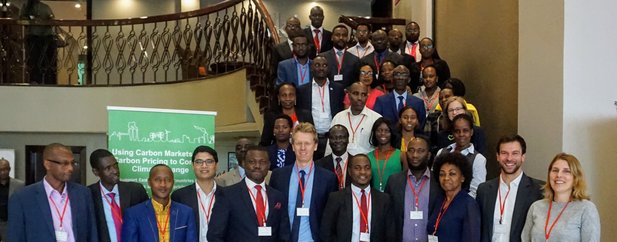
November 2018 - As many as 34 African countries refer to carbon mechanisms in their Nationally Determined Contributions (NDCs). This means that many countries in Africa, including Eastern African countries, are interested in exploring the potential of carbon market mechanisms to reduce emissions and to implement their countries’ NDCs. Article 6 of the Paris Agreement covers several approaches for which rules, procedures and guidelines are in the final phase of negotiation.
To promote related discussion, the GIZ Carbon Markets Project in Uganda implemented on behalf of the German Federal Ministry for Environment, Nature Conservation and Nuclear Safety (BMU) together with the UNFCCC Regional Collaboration Centre (RCC) Kampala and the Secretariat of the East African Community (EAC) hosted a Pre-COP24 Negotiators Forum for Eastern African countries. Held in the Kenyan capital of Nairobi from 30th October to 1st November, the event focused on carbon pricing and Article 6 of the Paris Agreement. The workshop brought together more than 40 public and private sector participants from Uganda, Kenya, Tanzania, Rwanda, Ethiopia and Burundi, many of whom were experienced negotiators. Presenters at the workshop included Margaret Barihaihi from the NDC Partnership (NDCP) who gave insights on the support opportunities for NDC implementation. Olufunso Somorin from the African Development Bank (AfDB) gave a presentation on the NDC Hub, an AfDB-led initiative to support African countries in achieving their NDC targets, while Amy Steen from UNFCCC delivered a profound analysis of Article 6.2, the progress made on the Paris rulebook in the run up to COP24 and the interlinkages of negotiation streams. Last but not least, and representing the Carbon Pricing Leadership Coalition (CPLC) as a Co-Chair of the African Workgroup of Carbon Pricing, Rachel Boti-Douayoua gave examples of carbon pricing approaches adopted in African countries.
During the forum, participants had the opportunity to enhance their technical capacities on general rules, procedures and processes within the UNFCCC negotiations framework as well as to analyze and discuss the various textual options being negotiated under Articles 6.2, 6.4 and 6.8. To complement the exercise, the interlinkages of Article 6 and Article 4 on accounting, Article 13 on transparency, as well as Article 9 on climate finance were discussed. In addition, the workshop introduced the position and key concerns of the African Group of Negotiators (AGN) on matters relating to Article 6. Participants also had the chance to get a global and regional overview of carbon pricing developments.
As a result of the forum, discussions between the countries relating to Article 6 will be used to inform the East African regional consultations on climate change. These took place during October until November under the auspices of the East African Community Secretariat, supported by the GIZ Carbon Markets Project. The outcome of EAC’s regional consultations will then feed into the AGN’s position paper on Article 6 and other climate change related matters during COP24 in Katowice. On the matter of carbon pricing, participants showed strong interest but stressed that they need to strengthen their understanding of the topic and how it can be utilized in relation to their countries’ emissions and NDCs.
The Pre-COP24 Negotiators Forum for Eastern African countries took place as part of the Global Carbon Market initiative. More
GIZ - Carbon markets promotion projec tin Uganda/East Africa
Climate Focus - Introduction of Participants
UNFCCC - Implementing the Paris Agreement: Progress on the work programme and interlinkages
Climate Focus - State of Article 6 negotiations under UNFCCC
AGN - Review of Article 6 and the ongoing negotiations process
AfDB - Carbon Finance and NDC Implementation in Africa
Climate Focus - Development of the CDM, Globally and in East Africa
NDC Partnership - Overview of the NDC Partnership
CPLC - Carbon pricing initiatives: CPLC & PMR in Côte d’Ivoire
UNFCCC - procedure and process
Article 6.2 - Cooperative Approaches, Discussion of key issues, options and East African priorities
Climate Focus - West African Alliance on Carbon Markets and Climate Finance
Cookie Settings
Marketing-Cookies werden von Drittanbietern oder Publishern verwendet, um personalisierte Werbung anzuzeigen. Sie tun dies, indem sie Besucher über Websites hinweg verfolgen.
Provider:
Statistik Cookies
Statistik-Cookies dienen der Analyse und helfen uns dabei zu verstehen, wie Besucher mit unserer Website interagieren, indem Informationen anonymisiert gesammelt werden. Auf Basis dieser Informationen können wir unsere Website für Sie weiter verbessern und optimieren.
Provider:
Erforderliche Cookies
Erforderliche Cookies sind für den reibungslosen Betrieb der Website zuständig, indem sie Kernfunktionalitäten ermöglichen, ohne die unsere Website nicht richtig funktioniert. Diese Cookies können nur über Ihre Browser-Einstellungen deaktiviert werden.
Provider: